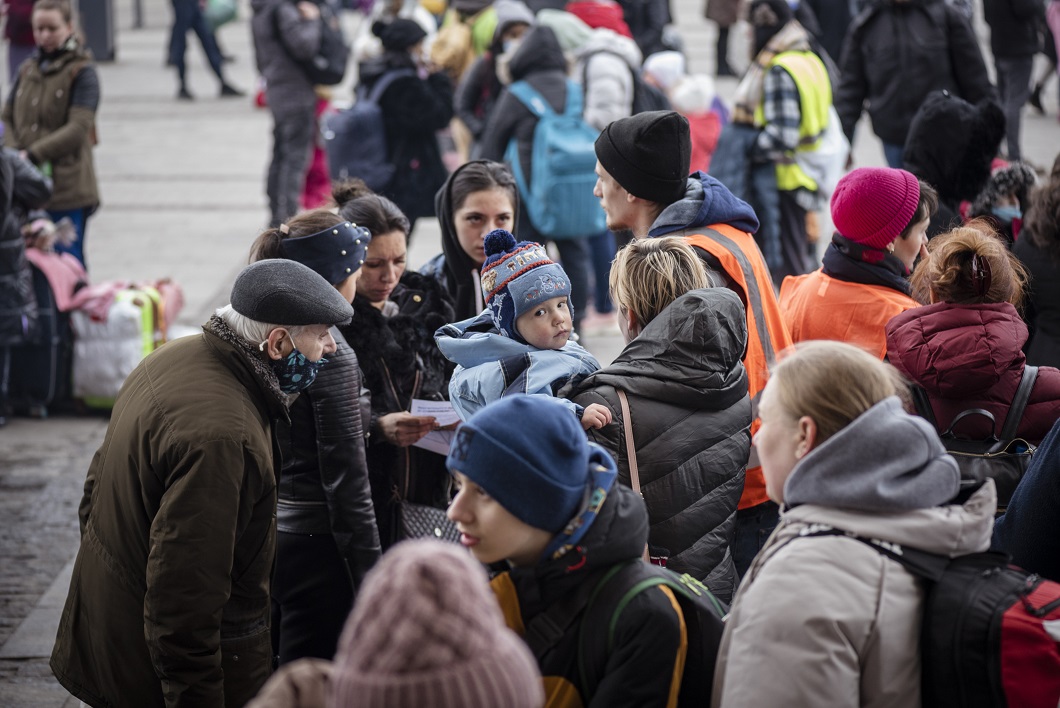
Felix Rodriguez, program associate
As the war in Ukraine enters its second month, the humanitarian crisis in the region has only been exacerbated, with reports of targeted attacks on civilians, and the shelling of health centers and transit stations. The United Nations estimates that over 10 million people have been forced to flee their homes, with an estimated 4.9 million leaving Ukraine altogether. The Biden administration has committed to allowing 100,000 Ukrainian refugee status with resettlement in the United States. However, the immigration and refugee resettlement process is slow. The U.S. government is currently expanding refugee processing in Eastern Europe (via its embassies) and is beginning to accept applications for resettlement but the process can take up to 18 months. It is estimated that many Ukrainians applying for resettlement in this manner will not arrive in the United States until summer 2023. As a result, many Ukrainians are flying to Mexico to apply for asylum at the U.S.-Mexico border alongside individuals and families from Central and South America and the Caribbean hoping to do the same.
While it is heartening to see innocent civilians find shelter, it should not be forgotten that alongside European refugees, there are countless Asian, Black and Brown families from countries in Africa, Asia, the Caribbean, Central and South America and the Middle East also seeking refuge due to circumstances in their home nation outside of their control. New American Pathways reports an increase of over 600% in arrivals in 2022 over the same time period in 2021 and 2020 (due to changes to policy made by President Biden); the organization expects an arrival rate of 600 families per year for the next few years. Included in those numbers are more than 70,000 Afghan refugees in the United States as a result of the American withdrawal from Afghanistan in 2021 (since September, the International Rescue Committee successfully welcomed nearly 800 Afghan evacuees to Atlanta).
The needs of refugees are both urgent and ongoing. Urgent needs include everything that would entail restarting your life from scratch; being picked up from the airport, enrollment into local schools, job placement, and navigating a new community. The most pressing challenge has been finding affordable housing options for all arrivals. Once families are successfully resettled, there is ongoing support needed for the trauma that comes from having to flee your home and nation. This is where local refugee organizations with cultural competence are critical to supporting our new neighbors on their path to self-sufficiency and healing.
Local refugee organizations have long recognized the multifaceted needs of our refugee community and established the Coalition of Refugee Service Agencies and the Welcome Co-Op to address those needs collaboratively. The Coalition brings together 21 local refugee and immigrant-serving organizations to highlight the cultural, social, and economic contributions of refugees and immigrants in Georgia. The Welcome Co-Op is a collaborative effort between four resettlement agencies, New American Pathways, the International Rescue Committee (IRC) in Atlanta, Catholic Charities Atlanta, and Inspiritus to collectively build partnerships with housing providers across the state. To support refugees coming to Atlanta, consider the organizations below and please consider providing general operating support to allow for more flexibility to address the needs of refugees during this fluid and ever-evolving time. Donors – please contact your philanthropic team with any questions or to make a grant.
Resettlement organizations:
- Catholic Charities Atlanta
- General operating dollars to expand capacity and bandwidth.
- Finding affordable housing for incoming refugees.
- Support of transportation services for newly arrived refugees who do not have a drivers license.
- Support for medical costs not covered by Medicaid (all incoming refugees are provided with Medicaid).
- Inspiritus
- International Rescue Committee
- New American Pathways to support:
- Capacity issues in the immigration department.
- Emergency funds for Ukrainians and other populations already here awaiting status adjustments.
- Hiring, training and onboarding Russian/Ukrainian speaking staff (one to two staff members in Q4 of this year or Q1 of FY 2023).
Organizations providing ongoing support to the refugee community:
- Afghan American Alliance of Georgia
- Carpathian Foundation
- Center for Victims of Torture Atlanta
- Clarkston Community Center
- Friends of Refugees
- Georgia Asylum and Immigration Network
- Refugee Women’s Network
- Tahirih Justice Center
If you would like to provide support to organizations providing direct response assistance to Ukrainians please see our previous blog post with a listing of organizations.
Categories
- Arts, Culture and Creative Enterprises6
- Book Club26
- Community108
- COVID-1934
- Donor Stories39
- Events30
- Great Grant Stories62
- Higher Ground168
- Housing and Neighborhoods14
- Impact Investing28
- Income and Wealth12
- Media22
- News158
- Nonprofits25
- Philanthropic Resources131
- Place-focused6
- Power and Leadership8
- Press Releases99
- Publications62
- TogetherATL21
- Uncategorized336
